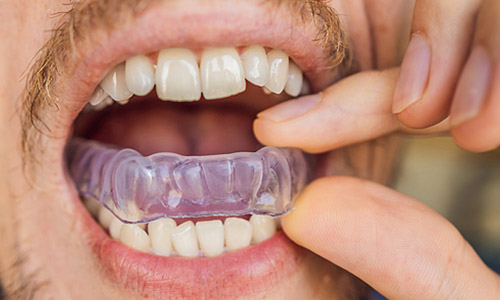Summary
Learn the signs of a TMJ flare-up and what you can do to reduce discomfort during this time. Get help managing TMJ symptoms effectively here.
If you’ve ever experienced jaw pain, headaches, or a clicking sound when you chew, you may already be familiar with temporomandibular joint disorder (TMJ).
The temporomandibular joint (TMJ) is the hinge that connects your jaw to the rest of your skull, and when inflamed or misaligned, it can cause symptoms that decrease your quality of life. Here’s how you can manage flare-ups and how holistic TMJ therapy can help you get long-lasting relief.
What Is a TMJ Flare-Up?
A TMJ flare-up refers to a sudden worsening or reappearance of TMJ disorder symptoms. These episodes can last for days or even weeks, depending on the severity and the underlying causes. Flare-ups often happen when there’s added stress on the jaw joint from teeth grinding, poor posture, stress, or even chewing hard foods.
While TMJ disorder is a chronic condition, flare-ups represent acute spikes in pain and dysfunction that need special attention. Recognizing the signs early on can help you reduce discomfort and prevent the flare-up from getting worse.
What Happens During a Flare-Up
During a TMJ flare-up, your jaw joint and surrounding muscles may become inflamed or overworked. Symptoms include:
- Increased jaw pain or tenderness. Sometimes this can radiate to the ears, neck, and shoulders during a flare-up.
- Aggressive popping and clicking sounds. If you hear noises when you open or close your mouth, this could indicate a poorly aligned joint or cartilage displacement.
- Limited range of motion. You might find it hard to fully open your mouth or move your jaw side to side if you’re in a flare-up.
- Headaches and migraines. Tension from the jaw muscles often travels to the temples or forehead, causing persistent headaches.
Symptoms can vary widely from person to person, and not everyone will experience the same kind of discomfort. The intensity of a flare-up can also change depending on external stressors or other existing health conditions.
How to Handle Increased Symptoms
Even though flare-ups can be painful and exhausting, there are some things you can do at home to help manage acute symptoms:
Use a Warm or Cold Compress
Use a warm compress to relax tense jaw muscles or a cold pack to reduce inflammation. Apply for 15–20 minutes at a time, several times a day. Never allow a hot or cold pack to touch your skin directly, and be sure to remove it after 20 minutes have passed to avoid injury.
Change Your Diet
During flare-up, it’s best to stick to soft foods that don’t require a lot of chewing. This includes things like gum, tough meat, hard candies, and chewy bread. Instead, opt for soups, mashed or pureed vegetables, and nutritional shakes.
Do Gentle Jaw Exercises
Gentle jaw stretching exercises can help increase mobility and reduce pain, but it’s important not to overdo it, since this can make things worse. Never overstretch your jaw or push past discomfort. If needed, Dr. Patel can prescribe custom exercises that are tailored to your symptoms.
Manage Your Stress
Stress and anxiety can cause unconscious jaw clenching, which exacerbates TMJ symptoms. Using relaxation techniques and eliminating sources of stress can be an effective way to reduce clenching, even when you’re not thinking about it.
Getting Permanent Relief from TMJ
There are several options for the long-term relief from TMJ pain, including:
- Customized orthotics. These devices help reposition your jaw to reduce tension and correct alignment issues. They can also protect teeth from grinding.
- Laser therapy. Non-surgical laser treatments can reduce inflammation and stimulate healing in the temporomandibular joint.
- Myofunctional therapy. This technique retrains your muscles to work in harmony with your jaw and tongue for optimal function.
Book Your Appointment with Dr. Namrata Patel Today
TMJ doesn’t have to keep you from going to work or enjoying your favorite activities. At Green Dentistry, Dr. Patel can help identify the root cause of your TMJ flare-ups and recommend a holistic treatment plan designed to give you maximum relief.
Call today to schedule your appointment by calling (415) 433-0119, or click here to request an appointment online.


